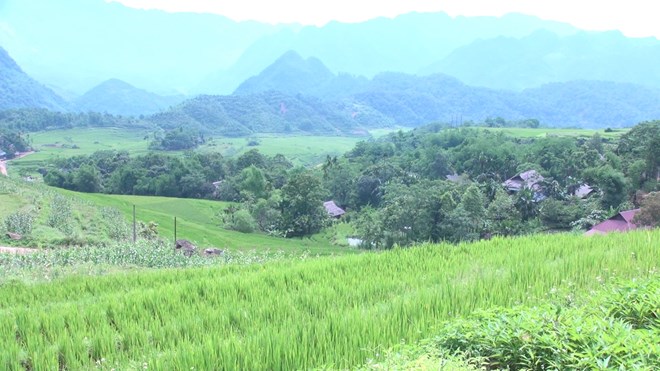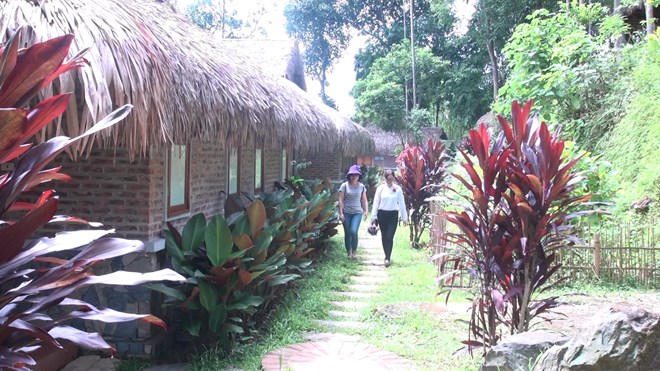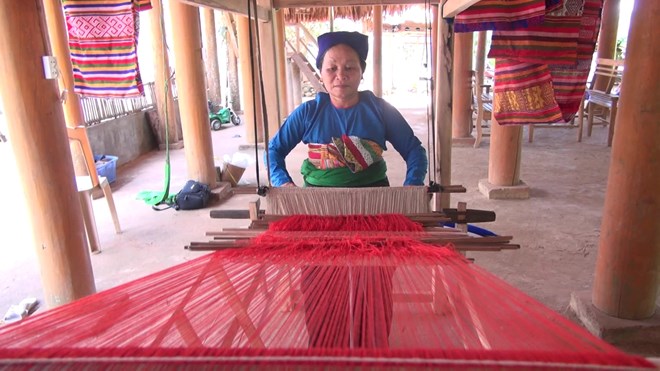
Though a poor village 10 years ago, Ban Don or Don village in the mountainous district of Ba Thuoc, Thanh Hoa province has now become one of the emerging travel destinations with its homestay service for visitors who wish to explore the local life.

A view of Don
village in Ba Thuoc district (Photo: VNA)
Over the last five months of this year, the village hosted nearly 10,000
tourists, mainly foreigners.
"This is among the most beautiful places I have visited in Vietnam,” said Gian
Marco, an Italian visitor. "The people are amazing, especially in the village.”

Gian Marco,
an Italian visitor (Photo: VNA)
Ha Van Thuoc, a local resident who offered homestay service, said since the
beginning of the year, his family welcomed 400 visitors, with 60 percent being
foreigners. The tourists, mainly from France, Switzerland and the US, joined
his family in their daily meals and visiting terrace fields.
Ba Thuoc district is now home to 58 homestay accommodations. More than 100
other households benefit by planting clean vegetables and weaving brocades for
these homestays.

Homestay
tourism services have helped local people escape from poverty (Photo: VNA)
Homestay tourism services have helped local people in the locality escape from
poverty and improve their livelihood.
"We have been providing tourism services since April 2017. We have improved our
livelihood thanks to tourism,” Ha Van Hoanh, another local resident of Don
village said. " I hope that the roads to the village will be widened to make it
easier for tourists to travel here,” he added.

A local is
weaving in a traditional manner (Photo: VNA)
According to Lo Van Thang, Vice Chairman of the Ba Thuoc district People’s
Committee, the district has been focusing resources on developing
community based tourism in Don and Kho Muong villages. It has also combined
building new style rural areas with the tourism service in the
localities.
The initial successes in Ba Thuoc are a vivid example for other districts to
make community based tourism an economic spearhead.
Source: VNA
Spanning thousands of hectares and winding gracefully along mountain slopes, hillsides, and riverbanks, the terraced rice fields of Lac Son District present a stunning and captivating beauty. This region, renowned for its remarkable terraced landscapes, is also the centre of Hoa Binh Culture known for numerous archaeological sites.
The life of Mong people in Hang Kia and Pa Co communes of Mai Chau district has improved much thanks to tourism development.
The man-made Hoa Binh Lake, with a water surface area of approximately 9,000 hectares and a capacity of 9.45 billion cubic meters, stretches over 200 kilometers from Hoa Binh to Son La provinces. With the goal of developing into a national tourism area, the Hoa Binh Lake tourism area is expected to not only become the largest tourism centre in the province but also one of the 12 key tourist destinations in the northern midland and mountainous region of Vietnam.
Da Bia hamlet, now Duc Phong, in Tien Phong commune, Da Bac district, was once almost isolated from the outside as the only way to the hamlet was to get a boat ride across the Hoa Binh reservoir. However, as its tourism potential has been unleashed, the hamlet has established itself as one of the most attractive destinations on the tourism map. It has even received the ASEAN Community-Based Tourism Awards in 2019.
In the first 9 months of 2024, Mai Chau district, Hoa Binh province welcomed over 684 thousand visitors to visit and relax. In which, over 516 thousand domestic visitors and more than 168 thousand international visitors. Total revenue from tourism is estimated at over 821 billion VND.
Da Bac district, bestowed with stunning landscapes, is developing ecological and resort tourism offerings. Several tourist sites, put into operation this year, has attracted throngs of high-spending and young domestic visitors.






